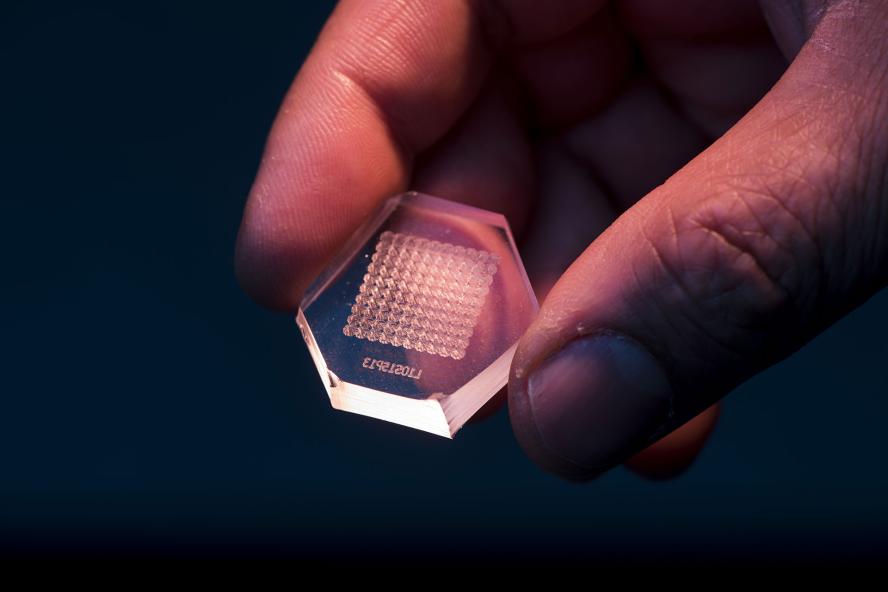Spring: Sep 15
Summer: n/a
Chemical and Biological Engineering
Civil and Environmental Engineering
Computer Science
Electrical and Computer Engineering
Mechanical Engineering
Part-time (Daytime)
Overview
The Bioengineering program provides a broad engineering and biotechnology curriculum while offering a focus on a specific engineering track that best fits students' interests and career choices.
Program Highlights
Choose between six tracks ranging from the study of tissue engineering and biological delivery to the development, control, and characterization of biological processes for water treatment and environmental restoration.
The program features two components: an interdisciplinary core curriculum, including one class outside of students' chosen sub-specialty to increase the breadth of bioengineering knowledge; and courses required by the department for students' chosen track.
The degree requires a minimum of 30 credits and the fulfillment of at least 10 courses at the 100-level or above with grades of S (satisfactory) or at least a B-.
Tracks include:
- Bioinformatics (administered by Computer Science)
- Biomaterials (administered by Biomedical Engineering)
- Biomechanical Systems and Devices (administered by Mechanical Engineering)
- Cell and Bioprocess Engineering (administered by Chemical Engineering)
- Environmental Biotechnology (administered by Civil and Environmental Engineering)
- Signals and Systems (administered by Electrical and Computer Engineering)
Graduate Cooperative Education (Co-Op) Program
The School of Engineering's Graduate Cooperative Education (Co-Op) Program provides students with the opportunity to apply the theoretical principles they have learned in their coursework to real-world engineering projects. Gain up to six months of full-time work experience, build your resume, and develop a competitive advantage for post-graduation employment. Learn more about the Co-Op Program.
Program Outcomes
The Bioengineering master's program provides a broad engineering and biotechnology curriculum, while offering a focus on a specific engineering track that best fits students' interests and career choices. This combination of depth and breadth gives our bioengineering graduates professional flexibility, a distinct competitive advantage in the ever-changing field of bioengineering.
Application Requirements
- Application Fee
- Resume/CV
- Personal Statement
- Transcripts
- Three letters of recommendation
- Official TOEFL, IELTS, or Duolingo test scores (if applicable)
- Portfolio (optional)
- GRE General Test scores are not required
Tuition & Financial Aid
At Tufts University, we believe every qualified applicant deserves the opportunity to pursue graduate study. We are dedicated to helping you understand your financial options and to ensuring that graduate education at Tufts is both accessible and within reach.
Tuition costs for this graduate program are billed at a per credit rate:
| Estimated Tuition for MS Program | |
|---|---|
| Tuition* | $1,799 per credit |
| Total Credits Required | 30 |
| Enrollment Status | Full-Time: 3-4 courses per semester (9-12 credits) Part-Time: 1-2 courses per semester (3-6 credits) |
| Estimated Tuition per Semester | Full-Time: $16,191 - $21,588 per semester (9-12 credits) Part-Time: $5,397 - $10,794 per semester (3-6 credits) |
| Estimated Total Tuition* | $53,970 |
*Estimated based on 2025-2026 tuition rates. Rates are subject to change each academic year. For further information about the full cost of attendance, including additional fees and estimated indirect costs (housing, transportation, etc.), please visit Student Financial Services.
The Tufts University School of Engineering offers partial, merit-based tuition scholarships for the majority of our graduate and certificate programs. All applicants are automatically considered for these awards as part of our holistic admissions review process—no separate scholarship application or additional materials are required.
Additional funding opportunities may include Tufts Double Jumbo Scholarships for Tufts graduates, Bridge Program Scholarships for students and alumni from select partner institutions, and veteran and military education benefits for eligible service members and their dependents, including participation in the Yellow Ribbon Program.
To further support your investment in a Tufts graduate education, a range of financing options are available, including federal and private student loans. For more details, please visit our Graduate Financial Aid page.
Career Outcomes

Average Salary: $100K+
Projected Job Growth (2022-2032): 5%
*Sources: Average salary and projected job growth statistics are from the U.S. Bureau of Labor Statistics Occupational Outlook Handbook.
Faculty

Nik Nair

Nik Nair
Research/Areas of Interest: synthetic biology, systems bioengineering, protein engineering, metabolic engineering, biofuels, biocatalysis

Shuchin Aeron

Shuchin Aeron
Research/Areas of Interest: Machine Learning, Statistical Signal Processing, Information Theory, Optimal Transport

Hoda Koushyar

Hoda Koushyar
Research/Areas of Interest: biomechanics, applied mechanics, materials characterization, engineering education

Srivalleesha Mallidi

Srivalleesha Mallidi
Research/Areas of Interest: Ultrasound imaging, photoacoustic imaging, multi-modality imaging, image-guided surgery and therapeutics, nano drug delivery systems

C. Andrew Ramsburg

C. Andrew Ramsburg
Research/Areas of Interest: multiphase flow and transport in porous media, liquid-liquid and solid-liquid equilibria, sols and emulsions, surfactants and interfaces, mass transfer, biotransformation, emerging contaminants

Donna Slonim

Donna Slonim
Research/Areas of Interest: data science, algorithms for analysis of biological networks, gene and pathway regulation in human development, algorithms for precision medicine, computational approaches to pharmacogenomics and drug discovery or repositioning